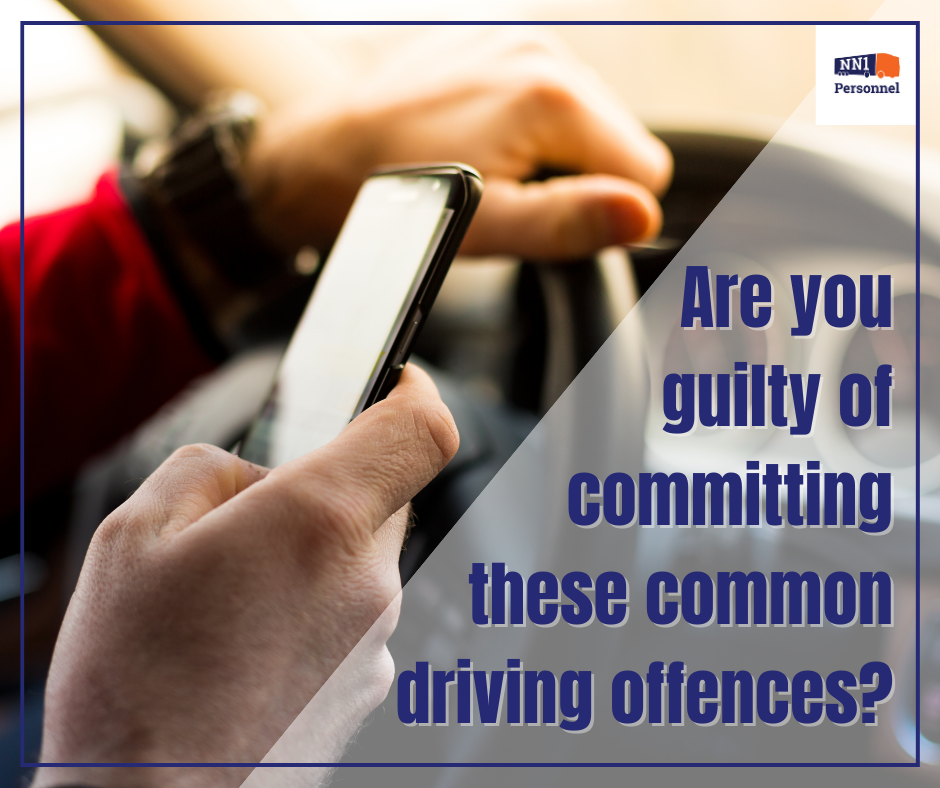Are you guilty of committing these common driving offences?

Are you guilty of committing these driving offences?
As a professional driver, you play a significant role in maintaining road safety and preserving your job. And yet, since 2015, when National Highways launched Operation Tramline, more than 33,254 driving offences have been recorded. Undercover police managed to catch 83 dangerous drivers in just three days by setting up an unmarked HGV on M4 and hiding in its raised cabin in February 2024.
The Fatal Five
Below, we take a look at the most common offences that HGV drivers make. We hope to help you avoid them, demonstrate your professionalism, responsibility and commitment, as well as keep your job as an HGV driver secure by raising awareness of these common mistake
- Using a mobile phone whilst driving. This is the most common offence that puts your life and the life of others at risk. Distractions from phone use like texting, calling, or using apps can significantly impact your ability to react to changing road conditions. Remember, it’s illegal to use handheld mobile devices while driving.. Penalty if caught: 6 points and a £200 fine. Check out our blog on hands-free mobile here.
- Not wearing a seatbelt. Some HGV drivers neglect to wear seatbelts. This increases the risk of severe injury or even fatality in the event of an accident. We hope you are not one of them. Never forget to buckle up!
- Speeding. Exceeding speed limits is a common offence among drivers of all types, including HGV drivers. Remember, reducing speed can prevent accidents and help maintain control of your vehicle. As a professional driver, you are responsible for transporting goods safely and efficiently. Sometimes the timing might seem crucial, but you cannot predict any road closures, or diversions, not to mention your need to take a break. Always adhere to speed limits, adjust your speed based on road conditions, and prioritize the safety of yourself, your load and other road users. Penalty if caught speeding: minimum £100 fine and 3 points.
- Careless driving. It refers to a lack of attention, consideration, or control while driving, which poses a significant risk to road users. Careless driving can include actions such as distracted driving, tailgating, aggressive manoeuvres, or ignoring traffic signals. This offence disregards the safety of others and can result in accidents, injuries, and even fatalities. It is essential for all drivers, including HGV drivers to prioritize attentiveness, patience, and respect for fellow road users to avoid careless driving and contribute to a safer and more harmonious driving environment.
- Driving under the influence. Another extremely serious and unfortunately very common driving offence is drink and drug driving. Impaired judgement, slower reaction times, and decreased coordination significantly increase the likelihood of accidents and injuries. By choosing not to drive under the influence, you actively contribute to safer roads and the well-being of everyone on them. If caught, you could be banned from driving, fined or even sent to prison.
The most serious driving offence
On Tuesday 28th June 2022 The Police, Crime, Sentencing and Courts Act 2022 came into force with changes to driving law, police powers, criminal justice, and sentencing legislation.
The changes to Road Traffic Offences now include harsher sentences for drivers who kill behind the wheel.
Causing death by dangerous driving is the most serious offence according to section 2B of the Road Traffic Act 1988: “A person who causes the death of another person by driving a mechanically propelled vehicle on a road or other public place without due care and attention, or without reasonable consideration for other persons using the road or place, is guilty of an offence.”
What does this mean to you as a driver? If you cause death by dangerous driving or careless driving under the influence of alcohol, or drugs or by using your mobile while driving, the judges now have the power to sentence you to life in prison. Previously, the maximum penalty they could give was 14 years imprisonment.
Check out our blog about dangerous and careless driving in more detail here.
Other driving offences
- Driving without proper rest breaks. As an HGV driver, you are subject to specific rules regarding rest breaks and maximum driving hours to ensure road safety. Failing to comply with these rules can result in penalties, including fines and potential license suspension.
- Lack of proper documentation. As an HGV driver you must carry a valid license, tacho card, CPC card, insurance certificates, and other necessary documentation while operating your vehicles. Failure to provide or produce the required documents upon request can lead to penalties. Keep your documents organized and readily accessible to avoid any potential issues during inspections.
- Overloading/insecure load. You must adhere to weight restrictions and load securement regulations. It is essential that all HGV drivers understand weight restrictions, follow load securement regulations, and regularly inspect their loads during transit. This ensures they are within legal limits and properly secured. By avoiding overloading and ensuring load security, you contribute to safer road conditions and protect the well-being of all road users.
Being a responsible HGV driver means not only delivering goods efficiently but also prioritizing safety on the roads. By avoiding these common driving offences—such as speeding, failure to comply with rest break regulations, , ignoring traffic rules, using mobile phones, driving under the influence, and ensuring proper documentation—you can maintain a clean driving record and contribute to a safer driving environment. Stay knowledgeable about traffic laws, practice defensive driving, and always prioritize the safety of yourself and others on the road. Safe travels!
Similar Posts:
- New driving law change – how does it affect you?
- Road Safety Week 2023
- Hands-Free Mobile is Legal. But is it Safe?
- Advice for newly qualified drivers: top tips
- Drivers’ hours fines: changes from 5 March 2018






